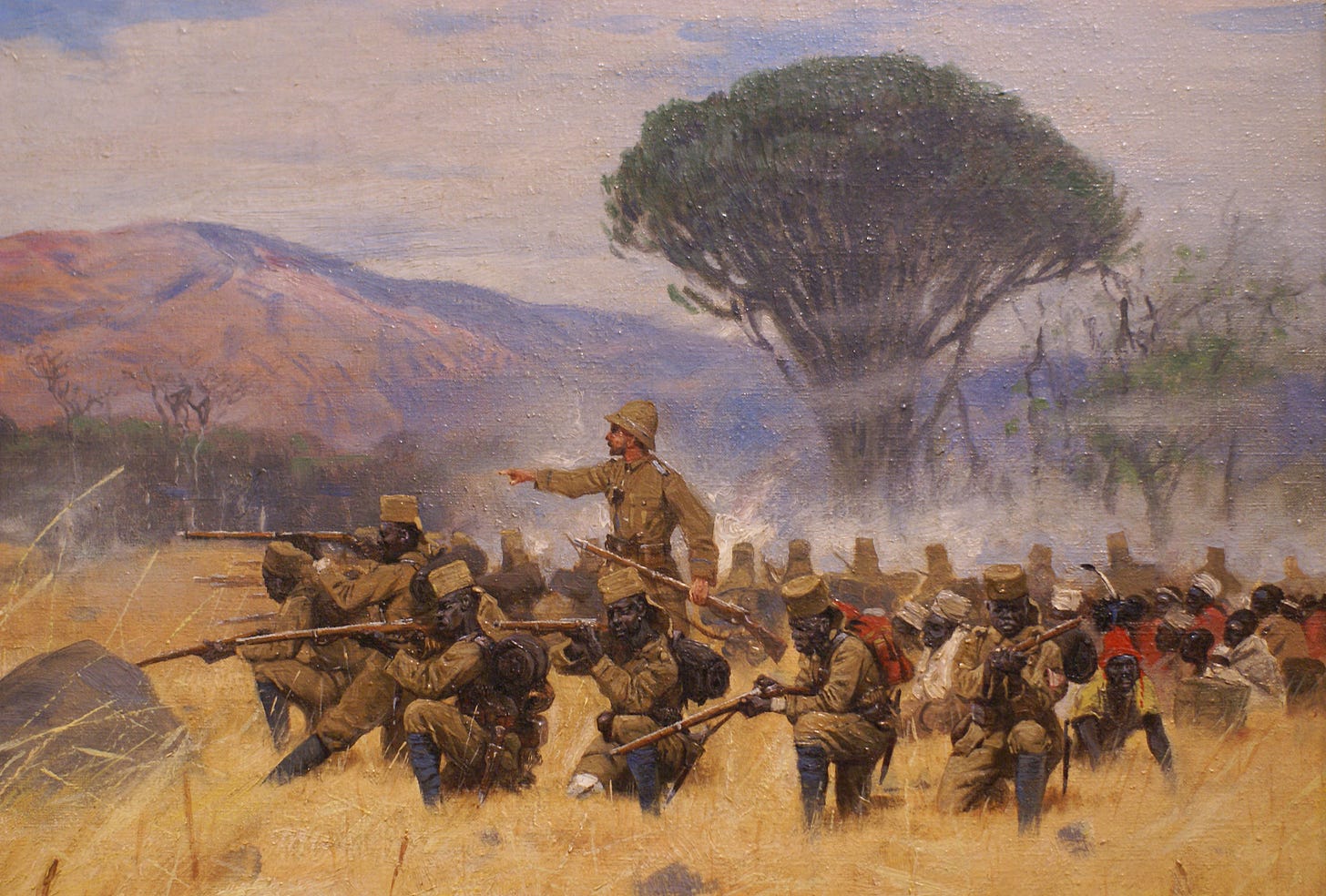
The Maji Maji Rebellion was an armed rebellion of Africans against German colonial rule in German East Africa, a territory which comprises modern-day Tanzania, Burundi, and Rwanda.
When in the world?
The German East Africa Company originated in 1884 as the Gesellschaft für deutsche Kolonisation (Society for German Colonisation) with the aim of trading in Africa. The German protectorate of Wituland (within modern Kenya) originated as a separate German sphere of influence in 1885. In April of the same year, the company leased the coastal strip opposite Zanzibar from Sultan Khalifa bin Said for 50 years. Its attempt to take over the administration of the land led to a general revolt along the coast of what is now Tanzania.
What in the world?
The Maji Maji rebellion was triggered by German Colonial policies designed to force the indigenous population to grow cotton for export. The war lasted from 1905 to 1907, during which 75,000 to 300,000 died, overwhelmingly from famine.
The oppressive regime bred discontent among the Africans, and resentment reached a fever pitch in 1905 when drought hit the region. A prophet—Kinjikitile Ngwale—emerged, who claimed to know the secret to a sacred liquid that could repel German bullets, called “Maji Maji,” which means “sacred water” in Swahili.
The apex of the rebellion came at Mahenge in August 1905, where several thousand Maji Maji warriors attacked but failed to overrun a German stronghold. In October 1905, the Germans retaliated with an attack on the camp of the Ngoni people who had recently joined the rebellion. The Muslim Ngoni chiefs were offered Christian baptism before execution.
This attack marked the beginning of a brutal counteroffensive that left an estimated 75,000 Maji Maji warriors dead by 1907.
Why in the world?
In the wake of the war, the imperial government instituted administrative reforms. The rebellion became a focal point in the history of the region. Journalist John Gunther noted in 1953, "even today the Southern Province of Tanganyika, the 'Cinderella Province,' has not fully recovered from the German terror half a century ago. The economy of the region has never been successfully rebuilt."
Later, Tanzanian nationalists used it as an example of the first stirrings of Tanzanian nationalism, a unifying experience that brought together all the different peoples of Tanzania under one leader, in an attempt to establish a nation free from foreign domination.
Other historians have challenged that view, claiming that the rebellion cannot be seen as a unified movement but rather a series of revolts stemming from a wide range of reasons, including religion.
Further Reading:
Novel - Afterlives by Zanzibar-born British author Abdulrazak Gurnah
An excerpt below:
The Germans had by then subdued all revolt in their Deutsch-Ostafrika, or so they thought. They had taken care of al Bushiri and the protests and resistance of the caravan traders on the coast. They had suppressed that rebellion after a struggle, captured al Bushiri and hanged him in 1889. The schutztruppe, the army of African mercenaries known as askari under the direction of Colonel Wissmann and his german officers, was at that time made up of disbanded Nubi soldiers who had served the British against the Mahdi in Sudan and Shangaan “Zulu” recruits from southern Portuguese East Africa. The German administration made a public spectacle of al Bushiri’s strongholds, into a German command post. Bagamoyo was also the terminus of the old caravan trade and the busiest port on that stretch of the coast. Winning and holding it was an important demonstration of German control of their colony.
There was still much for them to do, though, and as they moved inland they encountered many other peoples who were reluctant to become German subjects: the Wanyamwezi, Wachagga, Wameru, and most troublesome of all the Wahehe in the south. They finally subdued the Wahehe after eight years of war, starvation and crushing and burning out their resistance. In their triumph, the Germans cut off the head of the Wahehe leader Mkwawa and sent it to Germany as a trophy. The schutztruppe askari, aided by local recruits from among the defeated people, were by then a highly experienced force of destructive power. They were proud of their reputation for viciousness, and their officers and the administrators of Deutsch-Ostrafika loved them to be just like that. They did not know about the Maji Maji uprising, which was about to erupt in the south and west as Khalifa went to work for Amur Biashara, and which was to turn into the worst rebellion of all and elicit even greater ferocity from the Germans and their askari army.



